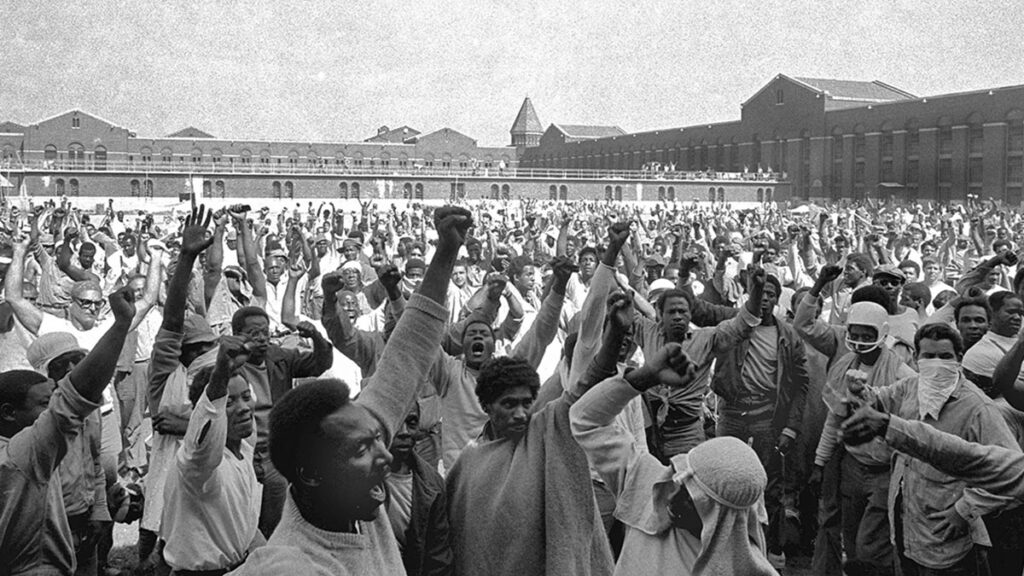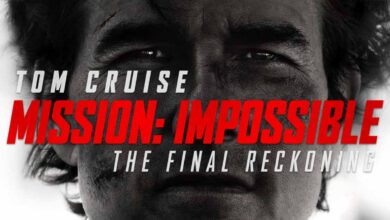TIFF 2021 Review: Attica
Attica (Stanley Nelson, 2021) is an American documentary film that recounts the events of the largest prison uprising in American history.

September 9, 1971, was the day first day of one of the most tragic and unforgettable events ever to unfold on American soil. Inmates of the Attica Correctional Facility in the quiet, small town of Attica New York, managed to acquire keys to the facility after badly beating one of the prison guards. Once they had the run of the prison, they took a number of hostages and secured one of the prison’s four cell blocks.
Quickly they moved out into the prison yard and put together an ad-hoc encampment which the inmates occupied. Realizing they had an opportunity to make a push for reforms to the way inmates were treated at the facility, they arranged for their hostages to remain safe while under their care, and to issue a series of demands to the authorities who were stationed in the remaining three blocks of the prison, and outside its walls.
Thus began a tense, five-day standoff wherein a civilian watch group was brought in as intermediaries between the authorities and the inmates. The inmates pushed for a list of 30 or so reforms to be instituted in exchange for the release of the hostages, and a return to their cells. The civilians went back and forth between the police and government officials, and the inmates, in an attempt to assist in a swift, and peaceful end to the standoff. That is not what happened.
50 years later, documentarian Stanley Nelson sits down with many of the participants and of those on the periphery, to tell their story. To record their testimony to be preserved for all of posterity. Attica is the resulting documentary film.
I’m not quite sure what to say about this film. It is violent, disturbing, and ultimately infuriating. All of these are exactly the kind of qualities a documentary like this should possess; the kind of responses it should inspire within its viewers. What far too many people have failed to realize in this country, and abroad, and indeed, all throughout history, is that law and order is rarely synonymous with justice.
While the film itself might suffer from being a slightly overindulgent, there is a wonderful monologue given by Oswaldo Mobray (Tim Roth) in The Hateful Eight (Quentin Tarantino, 2015) where he underscores the difference between true justice, and frontier justice. Suggesting that while people claim to want true justice, what they are really after is frontier justice. That justice that can not be delivered dispassionately isn’t really justice at all. Attica is the absolute embodiment of that very wisdom.
There is no need for me to recount the entire series of events that occurred in Upstate New York over those five days in 1971, the film does a fine job of that. However, there is a need for me to go on record as being militant about the fact that these events contained about as heinous a miscarriage of justice as could possibly occur. Coming off of having just viewed the film, I find myself so disturbed by the entire thing that I find myself having difficulty simply saying “this was an amazing documentary” or “Nelson tackles this atrocity in a thorough and unflinching manner.” While both statements are true, I’m having a hard time speaking of this film in a positive light, despite that fact that it has immediately become an essential patch in the quilt of the American story.
Honestly, going into Attica, I had virtually no idea about the events themselves. I wasn’t even aware Attica was a thing. All I knew is that it was some slogan that Sonny (Al Pacino) chanted in Dog Day Afternoon (Sidney Lumet, 1974). I knew that there must have been some significance to the word Attica for him to have screaming it in the first place, yet was unaware of why he was, and what exactly it was. “Okay, this has got to be the story behind that chant” I thought to myself. “Let’s check this out.” I was totally unprepared for the horror that was to follow.
Through a series of archival footage, news footage, and some intense talking head interviews, Nelson paints together a portrait of this tragedy that wasn’t only completely reprehensible in its time, but that has disturbing relevance to this day, and will continue to do so into the future. I did have a couple small gripes about the film, as far as the way the story is told. For one, I don’t feel Nelson built enough of a case in terms of taking stock of the inhumane treatment of the prisoners that led them to go as far as they did to try and affect real change. By the film’s conclusion however, that gripe had become relatively insignificant.
This is the kind of documentary that no human being could possibly claim to have “enjoyed.” Yet it is enlightening to the point that everyone should have to watch it. It really makes one have to confront the notion of justice, and how many times in the bloody history of our nation that it has been completely bastardized and mishandled in the name of law and order.
Attica is raw, powerful, and painful. Upon its conclusion I am almost aghast at how despicable people in power can be; how corrosive a force absolute power is. Most importantly, it has me wondering who are the real criminals here? And how come the worst, most despicable criminals almost always find themselves rich and in positions of power. Isn’t law and order supposed to exist for the purpose of keeping people safe, and making sure justice is done? It is becoming harder and harder to believe the bullshit and lies we are brought up to believe and continue to be told to us every day in this country, the more facts that are uncovered about our most controversial events.
My best advice? Watch this film as soon as you possibly can. Just make sure you’ve got some time to decompress before having to resume your interaction with society. Because if you are anything like me; if you are someone who believes that with a little care and compassion many of the more grievous injustices in this world could be avoided, you are gonna have some thinking to do following the conclusion of Attica. Because here’s the thing: the movie concludes, but the evil behind it is still burning hotter than Hellfire. To this day and beyond.
Review
Rating
RN Review of Attica
Attica is raw, powerful, and painful. The kind of documentary that no human being could possibly claim to have “enjoyed.” Yet it is enlightening to the point that everyone should have to watch it.



